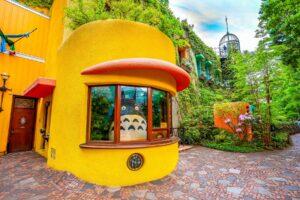Fodor's Expert Review Japanese Sword Museum
It's said that in the late 16th century, before Japan closed its doors to the West, the Spanish tried to establish a trade here in weapons made from famous Toledo steel. The Japanese were politely uninterested; they had been making blades of incomparably better quality for more than 600 years. At one time there were some 200 schools of sword making in Japan; swords were prized not only for their effectiveness in battle but for the beauty of the blades and fittings and as symbols of the higher spirituality of the warrior caste. There are few inheritors of this art today and the Sword Museum's mission is to maintain the knowledge and appreciation of sword making. Although the collection has swords made by famous craftsmen such as Nobufusa (a Living National Treasure) and Sanekage (a famous 14th-century sword maker), the focus here is on the swords as objects of beauty. The swords are individually displayed as works of art, giving visitors a chance to appreciate the detail, creativity,... READ MORE
It's said that in the late 16th century, before Japan closed its doors to the West, the Spanish tried to establish a trade here in weapons made from famous Toledo steel. The Japanese were politely uninterested; they had been making blades of incomparably better quality for more than 600 years. At one time there were some 200 schools of sword making in Japan; swords were prized not only for their effectiveness in battle but for the beauty of the blades and fittings and as symbols of the higher spirituality of the warrior caste. There are few inheritors of this art today and the Sword Museum's mission is to maintain the knowledge and appreciation of sword making. Although the collection has swords made by famous craftsmen such as Nobufusa (a Living National Treasure) and Sanekage (a famous 14th-century sword maker), the focus here is on the swords as objects of beauty. The swords are individually displayed as works of art, giving visitors a chance to appreciate the detail, creativity, and skill involved in crafting each one. In 2018 the museum moved to a larger location in Ryogoku near the Edo-Tokyo Museum.
READ LESS








